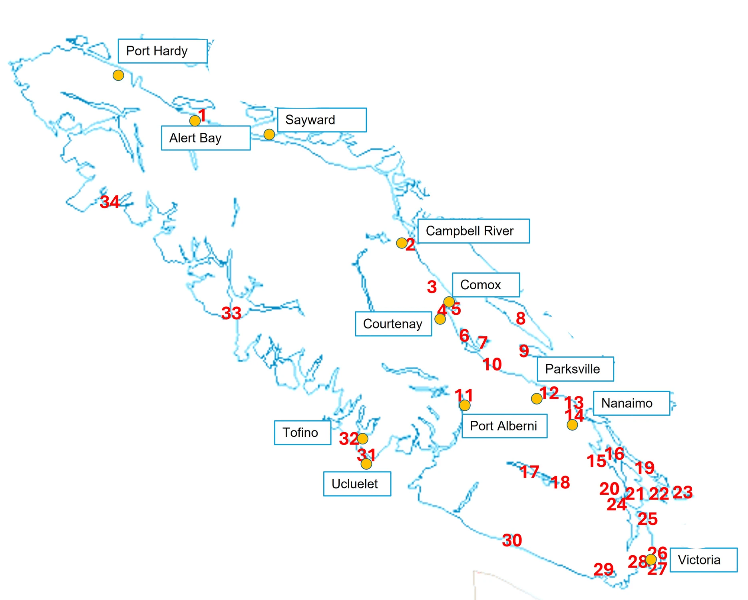
Vancouver Island Indigenous Information
- …
Vancouver Island Indigenous Information
- …
Vancouver Island Indigenous Information
Welcome to the Vancouver Island Indigenous Place Names Website!
- Explore the rich History, Heritage and Culture of the Indigenous People of Vancouver Island
- Learn about their Languages and ongoing Language Revitalization Projects
- Learn about their Traditional Territories, Plant Medicine, Archeological Information and Land Stewardship Practices
- Lean how to do Land Acknowledgements and what Reconciliation and Decolonization is
- Learn about Indigenous peoples fight for self-governance and equality
- Learn about the Gord Downie and Chanie Wenjack Fund and Youth Ambassador Program
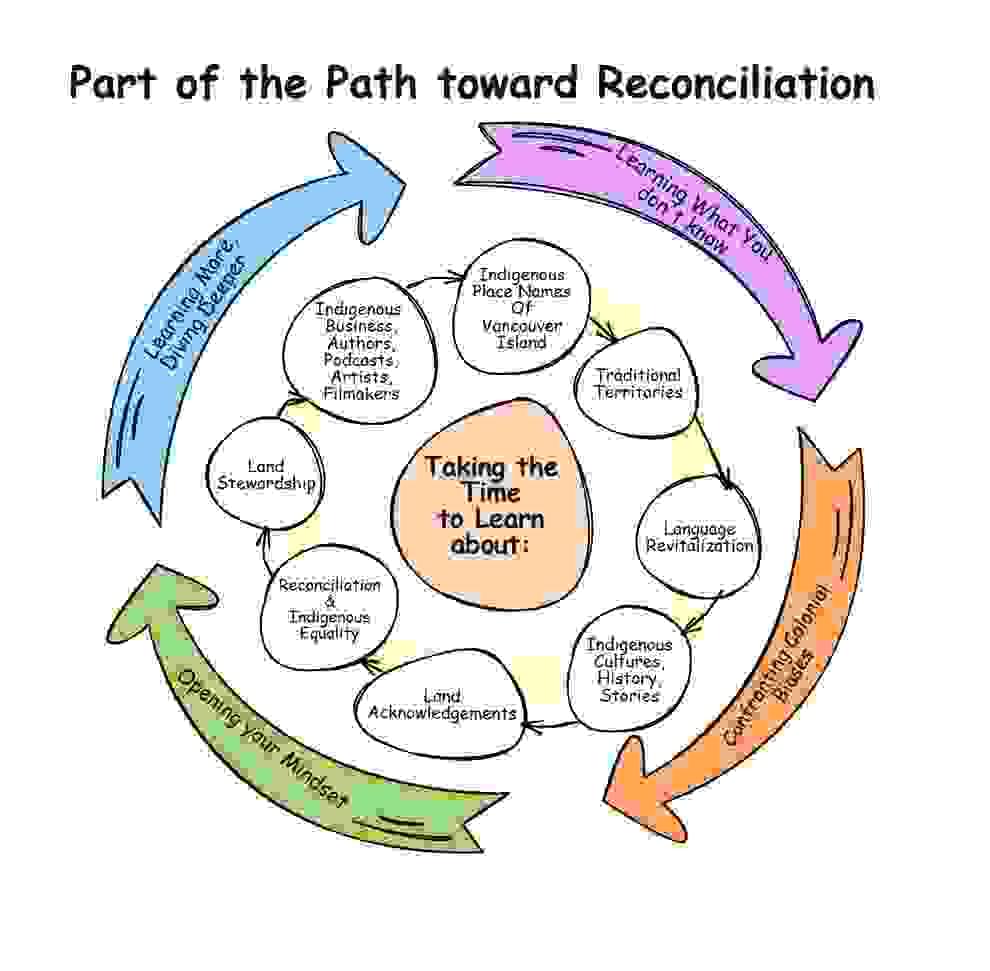
There IS a lot of information on this website - but it is here for a reason!
This website can help you learn about Indigenous Nations on Vancouver Island and become the start of your own reconciliation journey!
This site can help you learn about the land you live on or are visiting on Vancouver Island, and learn all about the Indigenous People who have called these lands home since time immemorial!
TAKE THE TIME over a few weeks, look at all the information, read the articles, look at the films, listen to the podcasts, read the 94 Calls to Action from the Truth and Reconciliation Commission, check out Indigenous Businesses and you will begin to decolonize your mindset and realize what your inherent colonial biases and privileges are.
YOU DON'T KNOW, WHAT YOU DON'T KNOW
BUT you have to start somewhere, and this site is a very good start on your own personal reconciliation journey!
Explore Information and Resources
about Indigenous People on Vancouver Island,
their languages, culture, history, traditional territories and more!
Click on the sections below to be taken to pages full of
interesting and engaging information
Indigenous Place Names
Learn more Indigenous place names and interesting facts that were not included in the pamphlet and learn about the place names in Comox and Victoria BC!
Indigenous Traditional Territories
Learn where the traditional territories of the 50 Indigenous Nations of Vancouver Island were, where their major villages were, the traditional names for these areas and villages and interesting information about these lands before colonization.
Indigenous Language Revitalization
Learn about what is being done to revitalize the languages that are on the Vancouver Island Indigenous Place Names Brochure. Visit the language learning sites and hear how words are pronounced in each language!
Culture, Traditions and Ceremonies of the Indigenous People on Vancouver Island
Learn about cedar, salmon, herring, Gary Oak ecosystems , Moon cycles and seasonal cycles, ceremonies and traditions. Learn how Indigenous peoples harvested the foods abundant on Vancouver Island, the Indigenous names for them, and how they cared for these sources of abundance throughout the millennia.
Land Acknowledgments
Learn how to do land acknowledgments properly, when to use them, why they are important and examples of land acknowledgements.
Gord Downie and Chanie Wenjack Fund (DWF) and the Youth Ambassador Program
Chanie Wenjack was a 12 year old Anishinaabe boy who died trying to walk hundreds of km home after running away from the residential school he was forced to attend. Gord Downie (from the band the Tragically Hip) was inspired by Chanie's story and worked with his family to create a Fund that creates cultural understanding and a path toward reconciliation.
What is Reconciliation, Decolonization, Equality vs Inclusion, Cultural Appropriation, and information about Residential Schools & the 60's Scoop and the trauma it caused and continues to cause today.
Learn what colonization, reconciliation, decolonization and cultural appropriation mean, learn the difference between equality and inclusion, and how you can begin your own reconciliation journey. Also learn about the dark history of Residential Schools on Vancouver Island and in Canada, and the 60's Scoop.
Information about Indigenous steps towards Self-Governance
Information about steps forward towards self-governance that Indigenous Nations on Vancouver Island have made with the provincial and federal governments.
Indigenous Land Stewardship and Conservation Practices
Learn about Indigenous Land Stewardship and ecological conservation principles and traditional practices that the First Nations people have practiced in British Columbia since time immemorial. Did you know land stewardship principles are encoded in Indigenous languages?
Indigenous Archeological Sites in the Comox Valley and Surrounding Areas
Information about 550 year old fishing weirs, shellfish middens, clam garden revitalization, a ,3800-year-old archaeological "wet site" discovery, and more.
Indigenous Businesses and Artists
There are many local Indigenous businesses and incredible artists on Vancouver Island that you can learn about and support!
Indigenous Authors
Learn about Indigenous Authors on Vancouver Island and where to purchase their books.
Indigenous Filmmakers
Learn about Indigenous filmmakers on Vancouver Island and how to watch the movies they have produced.
Indigenous Podcasts
Learn about Indigenous Podcasts from Vancouver Island and where to listen.
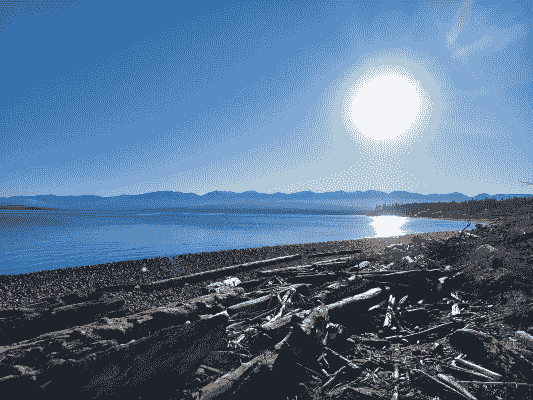
~ Traditional People of Vancouver Island ~
Vancouver Island is home to three distinct groups of Indigenous peoples: the Coast Salish, Nuu-chah-nulth, and Kwakwaka'wakw. There are 50 First Nations communities that fall into these three main groups. The Kwakwaka'wakw territory Includes North and North West areas of Vancouver island with adjoining areas of mainland B.C. The Nuu-chah-nulth territory spans most of the West coast of the Island, while the Coastal Salish territory covers the South East Island and the South most parts of the Salish Sea (Strait of Jan de Fuca). Indigenous cultures are deeply connected to the land and natural resources in these areas. Much of the First Nations territory in BC is ‘unceded’, which means it was never legally ceded, or given up to the crown (government), through treaty or other arrangements. This means it was taken by force from the original people who lived on the land since time immemorial.
The First People of Vancouver Island have lived here since time immemorial, had thriving communities and economies thousands and thousands of years before colonization, trading up and down the coast of Turtle Island (North America), across to Hawaii, Japan and down into South America. They navigated ocean currents with ancient knowledge and songs, hunted whales, seals and sea lions and survived off of the abundance of the land, beaches and waters. They were more then just hunters, artisans, carvers, and warriors. They had and have sophisticated systems of self-governance, strong and varied cultures, speak many languages and dialects and they effectively and sustainably managed and protected the land, plants, animals and waters throughout the millennia. They survived countless climatic and environmental disasters, such as a great flood and volcanic eruption, and have much to teach us about land stewardship and conservation principles. Each Nation has their own rich cultural heritage, traditions, history and land-based knowledge that you can learn more about on this website.
The Indigenous people of Vancouver Island are still here!
The Indigenous people of Vancouver Island are strong, resilient, revitalizing their languages, culture and ways of life, and are fighting for their rights for self-governance and sovereignty, so that they can continue to practice their ceremonies, culture and land practices as equal people of Turtle Island (North America).
Begin your own reconciliation and decolonization journey
by learning information from the other pages on this site
and by going farther and doing your own research.
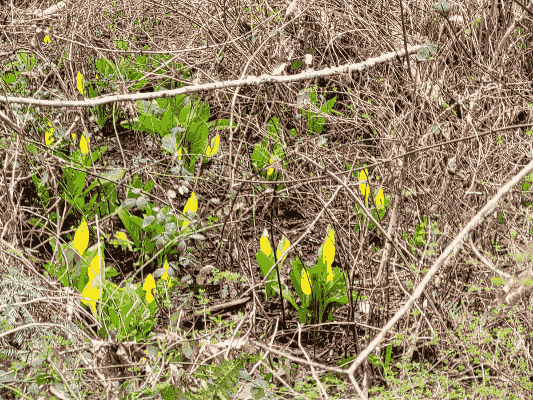
Land Acknowledgement
Hɛhewč ʔata gɩǰɛ ta Pentl’ach hɛga K’ómoks qaymɩxʷ. Kʷʊnɛtɛwoɬ ta gɩǰɛ tuwa akʷs χoχoɬ.
Hɛhewštʔata giǰɛ ta K’omoks First Nation - tuwa akʷs χoχoɬ ʔa xʷ yiχmɛtɛt ta giǰɛ.
(I am on the land of the Pentl’ach and K’ómoks peoples. Caretakers of the land since time immemorial.I am very grateful to the Pentl’ach and K’ómoks people, who have watched over this land since time immemorial.)
This land Acknowledgement is written in ʔayʔaǰuθəm (Ayajuthem),
the living dialect of the language traditionally spoken by the K'omoks people.
My name is Renee Petr, a 4th generation immigrant Canadian, whose families immigrated here from England, the USA and Russia. I live on Vancouver Island, B.C., Canada wihth my sister, mom and dad. I have lived on the land people now call Comox for the last 13 years. The land that I am living on in Comox, BC, Vancouver Island, originally known as Kw’umuxws, is the traditional and unceded territory of the Pentl'ach peoples, who were the original care takers of this land. However, due to Ligʷiłdaxʷ people moving southwards, the K’ómoks people came to inhabit this land, and the Pentl’ach people were pushed out of their territory and southwards. The lands across Comox still remember the Pentl’ach people who first lived here, in names such as Puntledge River, as well as Comox Lake, which was first known as Pentlatch Lake.
The K’ómoks First Nation includes ancestry from the Saɬuɬtxʷ (Sathloot), Sasitla, Ieeksen and Xa'xe, who are traditionally ʔayʔaǰusəm speaking peoples, as well as Pentl'ach and Ligʷiłdaxʷ peoples. This was because of intermarriage and amalgamation after the effects of colonization, which through diseases brought by colonizers decimated the populations of not only the Pentl’ach and K’ómoks peoples, but also peoples all across Vancouver Island and Canada.
The new name of this land, Comox, comes from a word in Lik’wala, the dialect of Kwak’wala spoken by the Ligʷiłdaxʷ people. This word, Kw’umuxws, which has been anglicized as Comox, means “plentiful”, meaning to the abundance of earthly gifts that this land holds, from the animals, plants and beautiful landscapes. So many animals and plants make this place their home, with traditional medicines and food everywhere you go. This land has provided for the people who have lived on it since time immemorial and continues to do so. I want to acknowledge this relationship and inspire others who live here to learn more about all of the earthly gifts that this land has to offer, which is an incredibly important starting point to start to build a relationship with the land and all of the living beings on it.The Vancouver Island Indigenous Place Names Brochure that I created
as part of the
DWF Youth Ambassador ReconciliACTION Project!
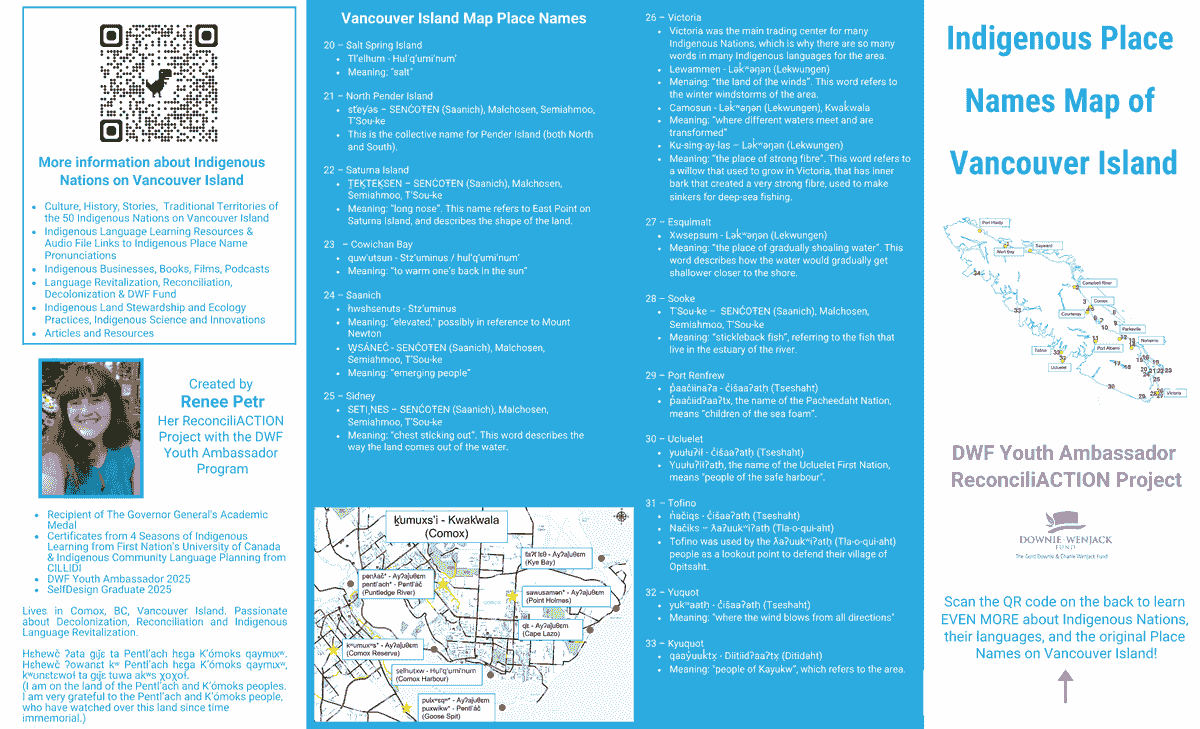
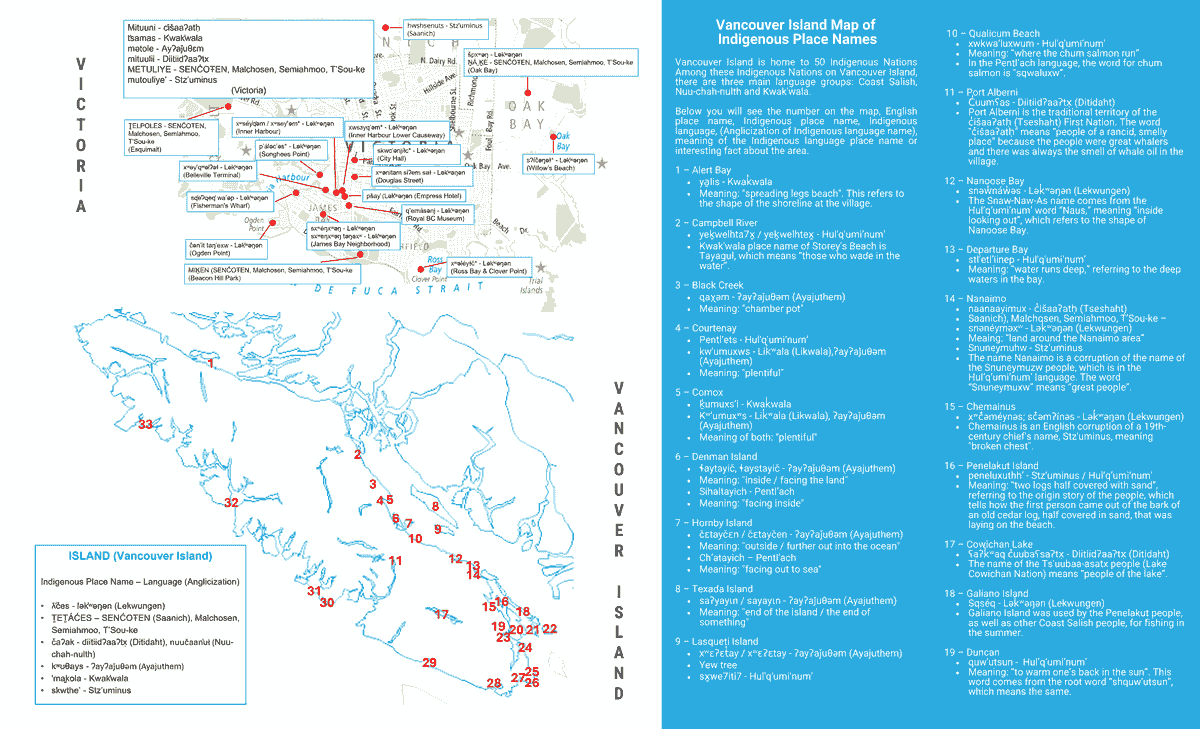
~ Why I created this Brochure ~
Renee Petr here again!, I am a 4th generation immigrant Canadian, whose families immigrated here from England, the USA and Russia. I live on Vancouver Island, B.C., Canada wihth my sister, mom and dad. I am a beginner speaker of ʔayʔaǰuθəm (Ayajuthem), the language of the K'omoks Nations in Comox, BC and I recently graduated from SelfDesign high school. My passions are Indigenous langauge revitalization and teaching people about reconcilation, decolonization, land acknowledgements, and land stewardship principes in Indigenous languages. I applied for and got accepted into the Gord Downie and Chanie Wenjak Youth Ambassador program in the summer of 2025. The program required students to create a ReconciliACTION project as an action towards reconcilation in their community.
The Vancouver Island Place Names Brochure that I created as part of the ReconciliACTION project, is a resource that local people and tourists to the Island can pick up from gas stations, gift shops, coffee shops, tourist information booths, and museums, to learn more about the Indigenous people of Vancouver Island and the unceded territories that they live on. The more we learn, the more we understand, the more we care and the more we try to fix a broken system.
The QR code on the brochure links to this website, where people can continue their learning on the Indigenous languages that are listed on the map and find out more information about the Indigneous people who speak these languages, their history, culture, traditions, stories, territories, and land stewardship principes they have been practicing since time immemorial. (Note: This brochure and website are not sponsored or approved by any Indigenous Nations or people on Vancouver Island. I have created this brochure and website as my own process or reconciliation.)
I hope the learning in the brochure and on this website inspires you to do more research on the Indigenous people of Vancouver Island and begin your own reconciliation and ReconciliACTION journey. I invite you to visit the links to Indigenous businesses, authors, film makers and artist found in the resources section on the site and I hope that it inspires you go further in your own research on the destructive history, laws and polices that the government of Canada and the provinces had and still have towards Indigenous Canadians.

Download a free copy of the Vancouver Island Indigenous Place Names Brochure!
If you want to carry the brochures in your business, please contact me at viindigenousinfo@gmail.com and I can either drop off the brochures and holder for free, if you live in the Comox Valley, or I can mail them to you.
You can print as many of these brochures as you wish, give them out, print them as maps for classrooms, use as teaching resources etc., but they are not allowed to be sold or used for any other purpose, but as a teaching tools towards reconciliation. Any other use is prohibited and these brochures are not allowed to be changed or modified in any way.
All intellectual property rights and copyright applies to the brochures and website and are owned by Renee Petr and viindigenousinfo.com and cannot be used without the expressed permission of the owner.
Brochure is to be printed on Legal paper.
Donate to our ReconciliAction Project and help us get our brochures out for free across Vancouver Island!
As part of my ReconciliACTION jounrey, I am providing the first set of brochures that go out to locations in the Comox Valley for free. I hope to find sponsors who will donate towards the printing costs, so that I can expand the reach of the program to Qualicum, Parksville, Nanaimo, Campbell River and down to Chemanius, Ladysmith, Duncan and hopefully Victoria one day!
If you donate to this ReconciliACTION project, all funds donated will go towards the cost of printing these brochures, purchasing the brochure holders and mailing them out.
You can be part of ReconciliACTION by helping provide brochures to businesses, organization and schools across Vancouver Island!
We thank you for your support!
FAQs
Questions about the Website and the Brochure
Where can I get a Vancouver Island Indigenous Place Names brochure or how can I carry these brochures in my business or get some for my school?
Who pays for these brochures to be made? How can I donate to this project?
Who collated all this information for the website and where did it come from?
What is the purpose of these brochures and this website?
What is my future goal for this ReconciliAction project?
Get in Touch with Me
I welcome your inquiries about the Vancouver Island Place Names Brochure, ReconciliAction Project and Website Information
©2025 - Vancouver Island Indigenous Information - Renee Petr - All Rights Reserved


















